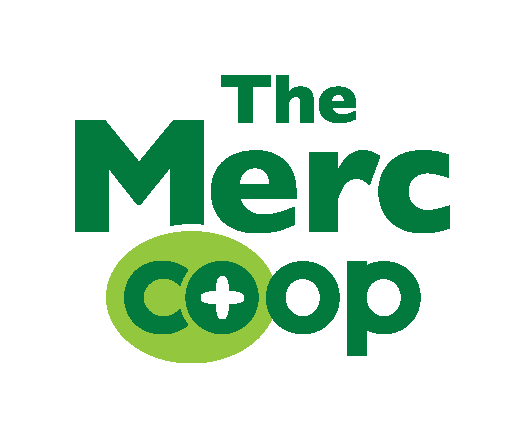The Merc Co+op is the only grocery store in town with fresh-never-frozen local turkeys!
Do I need to make a reservation to purchase a fresh holiday turkey?
We are pleased to share that no turkey reservations are needed. In the past, we made turkey buying more difficult than it should be. This year, co-op shoppers can rest assured that they will receive a fresh, never frozen, holiday bird without having to place a reservation with our meat and seafood department.
When will the turkeys arrive?
Fresh holiday turkeys will be available for purchase beginning Saturday, November 23 at 7:00 a.m. At that time and throughout the week shoppers will have an array of turkeys to choose from. Nonlocal turkeys are also available.
What size of turkeys will the co-op stock?
We have a variety of sizes to fit your event and appetite: small, medium and large full birds as well as select parts (breasts, legs, etc.) hand-cut by our professional butchers.
Are special orders or requests for cuts welcome?
Yes! Our skilled meat and seafood department enjoy helping you make memorable meals. If you are looking for a specific cut, we will make it for turkeys as well as all of our other meats: rib roast, goose, duck, pork roast and more.
What varieties of turkeys are available?
We offer local, natural and organic turkeys. All are free-range raised and free of antibiotics, preservatives and hormones. Both fresh and frozen turkeys are available for purchase
Where do the local turkeys come from?
We are the only grocery store in town offering local turkeys! Our local turkeys come from Bauman Cedar Valley Farms in Garnett and Vesecky Family Farms in Baldwin City. Find out more about these farms and others at www.themerc.coop/local.
About Our Local Producers
Bauman’s Cedar Valley Farms
Bauman’s Cedar Valley Farms
Located in Garnett, Kansas, Cedar Valley Farms is a family farm that produces pasture-raised eggs, chicken, turkey and duck - all of which are fed all-natural feeds with no added hormones or antibiotics.The Baumans bought 180-acre Cedar Valley Farms in 2003 and operate the only USDA-approved and certified poultry processor in Kansas. You can also find their eggs and chicken at the co-op year round.
Vesecky Family Farms
Vesecky Family Farms
Located in Baldwin City, Kansas, three generations of Veseckys work together to provide consumers in the Kaw Valley with a variety of berries, crops and pasture-raised turkeys. The Veseckys have been raising turkeys since 2006 and are involved in all aspects of the job. They get “poults” in the spring, and when fully feathered, they are turned out to pasture. The young turkeys are provided with grain and water and are free to graze on grasses and bugs. To protect the birds from predators, they are watched over by a Great Pyrenees dog.
Turkey Terms
Understanding some commonly used poultry-producing terms can help put you in the know. However, it’s important to know that some of the terms are regulated, while others are not. When in doubt about poultry terms or what’s offered at the co-op, just ask! Our skilled butchers are happy to talk turkey.
Organic. Poultry that meets the requirements of the National Organics Program (NOP) has been raised in housing that permits natural behavior, with outdoor access, has been fed certified organic GMO-free feed (including pasture), has not been given antibiotics or hormones and has been processed organically. The USDA organic label requires producers to follow production and handling practices in accordance with the national standards; certifying agents ensure compliance through annual inspections.
Free-range. This USDA regulation means that the animal has been allowed access to the outside. The government doesn’t specify that poultry must go outside, for how long, or the amount or kind of space that must be provided, but the idea is that poultry is free to roam outdoors and engage in natural behaviors (this is the way most poultry was raised before high-density confinement was introduced in the 1950s). And poultry that exercises produces leaner meat.
Natural. USDA allows this label to be used when a product contains no artificial ingredients or added colors and is only minimally processed. The label must explain what “natural” means, so be sure to read on. It might say “no added colorings or artificial ingredients; minimally processed,” for example.
“No hormones added” means just that, but keep in mind that Federal regulations prohibit the use of hormones in raising poultry, so this term should apply to all poultry anyway. Regulations also require that if a poultry label says, “no hormones added,” it must also say, “Federal regulations prohibit the use of hormones.”
“No antibiotics added” means that the producer has provided documentation to the USDA that the animals were raised without antibiotics.
Cage-free. Poultry that’s cage-free is allowed to roam, but not necessarily outdoors. This allows poultry to engage in some natural behaviors, such as walking, nesting, and perching. However, this term is not regulated by USDA nor by third-party certifiers for poultry, though it is regulated for eggs.
Pastured poultry. This is a term coined for chickens raised on grass pasture all of the time after the initial brooding period. However, this term does not guarantee that poultry feeds only on pasture.
Fresh. A “fresh” poultry label means that the temperature of the raw poultry has never been below 26 degrees F. (Frozen poultry, on the other hand, has a temperature of 0 degrees F or below.) A turkey could be kept at 27 degrees F for weeks or even months, though, and then sold as “fresh.” Ask our butchers for details on the freshness of our birds.



